 Petzlover
Petzlover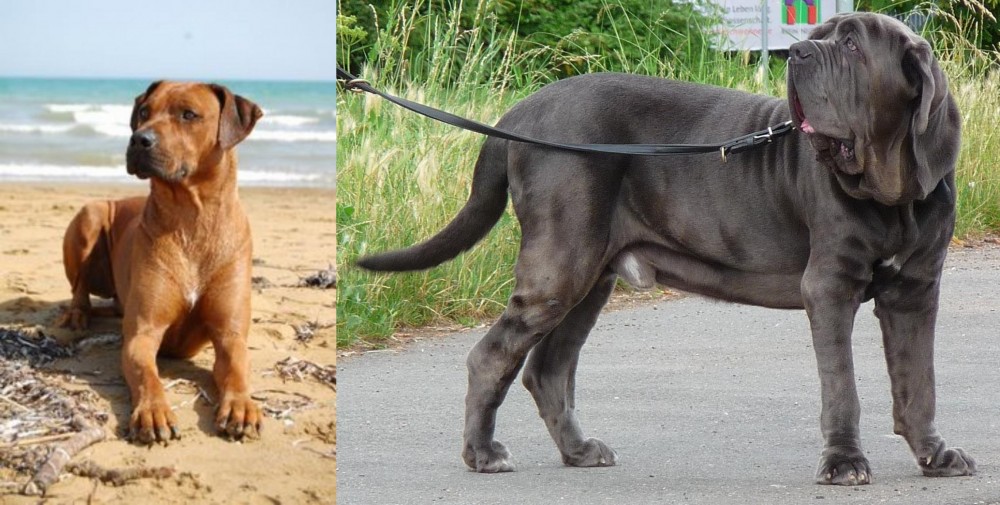 Rhodesian Ridgeback is originated from Zimbabwe but Neapolitan Mastiff is originated from Italy. Both Rhodesian Ridgeback and Neapolitan Mastiff are having almost same height. Rhodesian Ridgeback may weigh 38 kg / 83 pounds lesser than Neapolitan Mastiff. Rhodesian Ridgeback may live 5 years more than Neapolitan Mastiff. Both Rhodesian Ridgeback and Neapolitan Mastiff has almost same litter size. Rhodesian Ridgeback requires Low Maintenance. But Neapolitan Mastiff requires Moderate Maintenance
Rhodesian Ridgeback is originated from Zimbabwe but Neapolitan Mastiff is originated from Italy. Both Rhodesian Ridgeback and Neapolitan Mastiff are having almost same height. Rhodesian Ridgeback may weigh 38 kg / 83 pounds lesser than Neapolitan Mastiff. Rhodesian Ridgeback may live 5 years more than Neapolitan Mastiff. Both Rhodesian Ridgeback and Neapolitan Mastiff has almost same litter size. Rhodesian Ridgeback requires Low Maintenance. But Neapolitan Mastiff requires Moderate Maintenance
 Known as the African Lion Dog, the courageous Rhodesian Ridgeback hails from Rhodesia, now Zimbabwe.
Known as the African Lion Dog, the courageous Rhodesian Ridgeback hails from Rhodesia, now Zimbabwe.
He was bred essentially to be a hunter as well as a home guardian. These dogs were crossed with European dogs, with the original breed standard being drafted by F.R. Barnes By the 1860s, European colonisers had imported certain European dog breeds to the area such as Greyhound, Terriers, Bloodhounds as well as other breeds. These were mixed with the indigenous African dogs.
The Ridgeback Club was also founded. It was in 1955 that the American Kennel Club recognized the dog as a member of the Hound group.
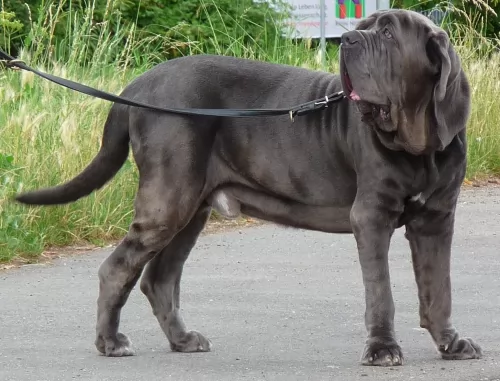 An ancient breed, the Neapolitan Mastiffs are massive dogs with a history of protecting their family and their property. The breed has deep rooted protective instincts and they are very frightening in appearance. The Neapolitan is of the Molosser group of dogs, all of whom probably came from the same line. It is known that all the mastiffs in Europe are descendants of the Tibetan Mastiff. The Tibetan Mastiff is considered the most ancient of all canines.
An ancient breed, the Neapolitan Mastiffs are massive dogs with a history of protecting their family and their property. The breed has deep rooted protective instincts and they are very frightening in appearance. The Neapolitan is of the Molosser group of dogs, all of whom probably came from the same line. It is known that all the mastiffs in Europe are descendants of the Tibetan Mastiff. The Tibetan Mastiff is considered the most ancient of all canines.
The Asian Mastiffs came from India to Greece around 300 BC with Alexander the Great. Then the breed was brought to the Romans by the Greeks and then introduced them in their circus in fights. Another possibility is that around 500 BC the mastiffs came to Britain from the Phoenicians. Either way the Roman Molossus is the ancestor of the Neapolitan Mastiff.
The Romans crossed the breed with the English Mastiff around 55 BC and developed a premiere war dog that was called a Mastini.
The breed eventually became extinct in Europe with the exception of Campania. The breed was recognized in 1946 with the standard accepted in 1949. However, it is believed that the Neapolitan Mastiff has been continuously present in Campania for over two thousand years. The breed was initially developed as war dogs and for the Roman coliseum spectacles.
In 1946 Dr. Piero Scanziani established a program to breed them in Italy. He wrote the breed standard in 1949.
Today the Neo is a farm dog, an army dog, a police dog and a guard dog. They were shown in Italy for the first time in 1946 but only in 2004 was the breed recognized by the American Kennel Club (AKC). It was 1973 when the Neapolitan Mastiff Club of America was born and 1996 when the standard was approved by the AKC. They are still a rare breed in the United States.
 Perhaps the most noticeable thing with this large, handsome formidable looking dog is the ridge of hair that runs along his back and gives him his name. The rest of the coat is short and smooth and can be a reddish tan color or wheaten shade.
Perhaps the most noticeable thing with this large, handsome formidable looking dog is the ridge of hair that runs along his back and gives him his name. The rest of the coat is short and smooth and can be a reddish tan color or wheaten shade.
He is a slender, athletic dog with an alert, intelligent face. The ears of the dog are floppy and carried close to the head, being broad and then narrowing to a rounded ear. The tail is long,broad at the base and tapers. He is a large dog that stands at between 61 and 69cm and weighs between 29 and 41kg.
In spite of his athletic build, he isn’t an overly active dog like many other breeds but will require a walk ever day as well as ball- and rope games.
He is a quiet, gentle dog, strong and confident, while also being strong willed and independent. He is tolerant around children, but isn’t the kind of dog that relishes being around little kids who try to climb over him.
He is smart and can be easily trained. Training and socialization turn him into an awesome pet.
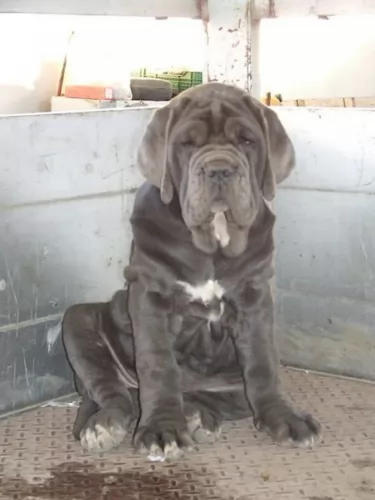 The Neapolitan Mastiff is a massive dog , so powerful and very intimidating in his looks. With an incredibly large head and hanging folds and wrinkles, the Neo is an impressive animal. His inner nobility and dignity is evident in his stance and the way he holds himself. He is relaxed, calm, quiet yet imposing none the less. His coat is dark whether black, tawny, gray or mahogany. He is muscular beyond imagination. The Neo is 10-15% longer than he is tall.
The Neapolitan Mastiff is a massive dog , so powerful and very intimidating in his looks. With an incredibly large head and hanging folds and wrinkles, the Neo is an impressive animal. His inner nobility and dignity is evident in his stance and the way he holds himself. He is relaxed, calm, quiet yet imposing none the less. His coat is dark whether black, tawny, gray or mahogany. He is muscular beyond imagination. The Neo is 10-15% longer than he is tall.
On his massive head his eyes are deep set and covered by his eye lids that droop. His eyes are blue as puppies then dark and coordinated with his coat. and his nose is large and the color of his coat. Ears are natural or can be cropped, and they carry their tail straight and curving back. The Neo has round paws and arched toes.
 Your Ridgeback is a dignified dog who is devoted to his human family, being aloof around strangers.
Your Ridgeback is a dignified dog who is devoted to his human family, being aloof around strangers.
He is a territorial dog and takes his job as guard dog seriously. He is confident and independent, and with his good looks, his loyalty and devotion, he is guaranteed to make you a most splendid pet and companion.
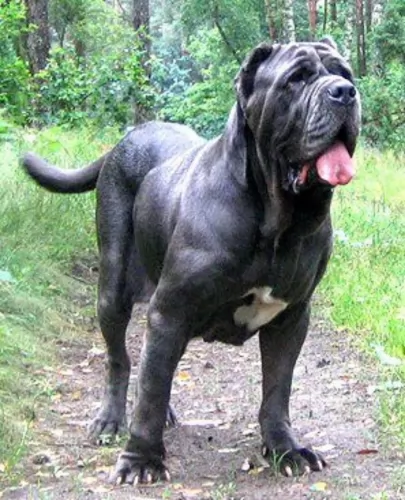 Older children in their family. No toddlers or strangers.
Older children in their family. No toddlers or strangers.
Protective yet quiet, calm, relaxed
No they won’t adapt well to apartment living or to strangers.
They are intelligent and trainable but must be socialized and know the human is the alpha or they will take over.
 Rhodesian Ridgebacks are generally healthy, robust dogs, but like with all breeds, they can also have their share of some of the common dog illnesses there are.
Rhodesian Ridgebacks are generally healthy, robust dogs, but like with all breeds, they can also have their share of some of the common dog illnesses there are.
If you’re buying a puppy, make sure it comes from a good breeder.
This is a hereditary disease which can become worse because of environmental factors such as rapid growth. The thighbone doesn’t fit properly into the hip joint.
It is sad when you see such a strong dog succumbing to hip dysplasia as it can cause a lot of pain and also make your dog lame. Arthritis can also occur.
For such a life threatening illness with a dog, it is wise to familiarize yourself with an emergency vet in your area. A dog with bloat needs to be rushed to the vet as soon as possible.
That is why it is better to feed your pet smaller meals daily rather than one big meal. Bloat is an ailment where there is rapid accumulation of gas in the stomach.
Dogs with deep chests are at a greater risk of bloat. Typical symptoms of bloat include restlessness, a swollen, hard stomach and trying to vomit.
Canine bloat or gastric dilatation and volvulus is a killer with dogs, with the gas accumulation causing the stomach to twist.
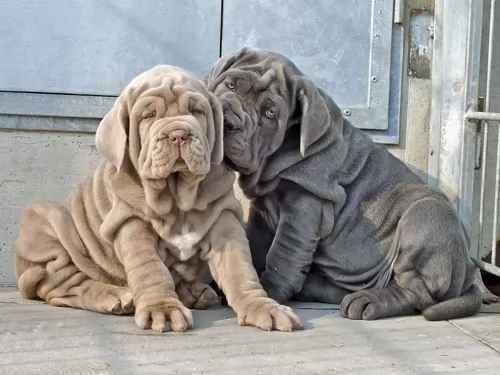 The Neapolitan Mastiff is prone to many of the same issues as any massive, extra large breed. The most common of these is Cherry Eye.
The Neapolitan Mastiff is prone to many of the same issues as any massive, extra large breed. The most common of these is Cherry Eye.
 The Rhodesian Ridgeback only sheds a little so you can keep him looking good with a brush twice a week.The shiny coat can be maintained by wiping him down with a damp cloth. Look out for any unusual lumps you might find.
The Rhodesian Ridgeback only sheds a little so you can keep him looking good with a brush twice a week.The shiny coat can be maintained by wiping him down with a damp cloth. Look out for any unusual lumps you might find.
He has floppy ears so during your grooming session check inside his ears and make sure they aren’t red. You can suspect an ear infection when you see your Ridgeback shaking his head or scratching his ears.
Check inside your Ridgeback’s mouth too as dogs can’t tell you when they’ve got a rotten tooth that is causing terrible pain and also poisoning their entire system.
Trim his nails too if they don’t wear down naturally.
Your large Rhodesian Ridgeback will need good food from you if you want to have less visits to the vet because of illness.
If you have a puppy feed him 4 bowls of food a day, but once your dog is one year of age he can have two bowls of food. Two bowls are better than one as with one bowl, your dog becomes ravenous and gobble his food down. This can lead to bloat.
It is always convenient to feed him one of the top quality commercially manufactured dog foods but he will also need some tasty home-made food too. Boiled chicken, brown rice or pasta and spinach, sweet potatoes and carrots are a healthy choice for your pet – plain and simple dog food, just like dogs want.
They don’t want exotic, spicy foods that humans eat as it upsets their stomach. Chop this home-made food up ad put it into his dry kibble twice a week for a treat. Also try to give him a bit of raw meat occasionally. Never leave him without a constant source of fresh, cool water.
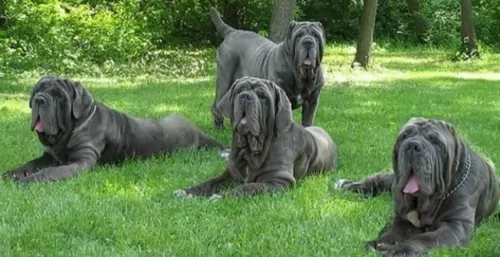 Neapolitans grow fast and so don’t overfeed when they are young. Lower protein and higher fat content.
Neapolitans grow fast and so don’t overfeed when they are young. Lower protein and higher fat content.
Don’t overfeed the adult as they can become obese.
This big hearty breed needs exercise but not too much. They overheat easily. The puppy will push himself, so you have to make sure he doesn’t over do it. No tug of war games. They need a long walk twice every day.